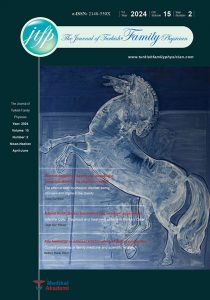Behaviors and problems of a medical school students’ related to distance education in pandemic medical education in the pandemic process
Introduction and Aim: In a medical school, to determine whether students have the necessary infrastructure for distance education, students’ access to educational materials, the concerns and expectations of students about the process.
Methods: First, second, third, fourth and fifth-year students, continue through distance education in the pandemic process in Cumhuriyet University Medical School, were included in the study. 336 students volunteered to participate in this descriptive research. The data collection tool used in research was created by the researchers. The data collection tool created by the researchers consists of 24 questions that the descriptive variables of students, their study status and problems in distance education process.
Results: Students’ 91.4% entered the university’s distance education module. 82.1% of them stated that they studied less than the old working program during this process. Participants’ 19.3% did not have a suitable study environment at home, 19.6% of them did not have a computer and 12.2% of them had an irregular internet connection. There were significant differences between the presence of a suitable environment for home study (p=0.001), the internet access status (p=0.004) and the frequency of study. The answers given by students to the question of their concerns/problems related to this process; concerns about the distance education module (not getting feedback, problems with material adequacy, etc.) (42.3%), the lack of training (39.0%), concerns about the exam (28.9%), decreased will to study (16.7%), fail the class/low grades (14.6%) were gathered in these main categories, respectively. Participants’ 76.5% felt the lack of occupational practice. 61.6% of them demanded the increase of multimedia items in the materials uploaded to the system.
Conclusion: Depending on the pandemic, the duration of distance education process remains uncertain. In this process, especially in occupational practice-oriented faculty such as medical faculties, students have concerns related to these deficiencies. In addition, when planning distance education, faculties should consider students’ availability of having devices and internet access.
References
- World Health Organization 2020; https://www.who.int/emergencies/diseases/novel-coronavirus-2019 adresinden 25.05.2020 tarihinde ulaşılmıştır.
- Türkiye Bilimler Akademisi, COVID 19 Pandemi Değerlendirme Raporu;http://www.tuba.gov.tr/ files/images/2020/ kovidraporu/ Covid-19%20Raporu-Final+.pdf adresinden 25.05.2020 tarihinde ulaşılmıştır.
- Yüksek Öğretim Kurulu 13.03.2020 tarihli duyurusu; https://www.yok.gov.tr/Sayfalar/Haberler/ 2020/coronavirus_ bilgilendirme_1.aspx adresinden 25.05.2020 tarihinde ulaşılmıştır.
- Yamomoto GT, Altun D. Coronavirüs ve çevrimiçi (online) eğitimin önlenemeyen yükselişi. Üniversite Araştırmaları Dergisi 2020;3(1):25-34.
- Gürpınar E, Zayim N. Tıp eğitimi ve e-öğrenme. Tıp Eğitimi Dünyası 2008;27:19-25.
- Çakır Ö, Calp MH, Doğan A. Uzaktan eğitimde içerik geliştirme süreci: Gazi Üniversitesi Bilişim Enstitüsü örneği. Cumhuriyet International Journal of Education 2015;4(1):1-20.
- Sivas Cumhuriyet Üniversitesi Duyurular; https://kampus.cumhuriyet.edu.tr/Account/Login?ReturnUrl= https%3A%2F%2Fkampus.cumhuriyet.edu.tr%2F adresinden 26.05.2020 tarihinde ulaşılmıştır.
- Sivas Cumhuriyet Üniversitesi Duyurular; http://www.cumhuriyet.edu.tr/duyuru/22559-uzaktan-canli-ders-videolari-hakkinda-duyuru adresinden 26.05.2020 tarihinde ulaşılmıştır.
- Demir E. Uzaktan eğitime genel bir bakış. Dumlupınar Üniversitesi Sosyal Bilimler Dergisi 2014;39:203-11.
- Memiş A. Öğrencilerin çalışma oryantasyonlarını etkileyen demografik faktörler. Türk Eğitim Bilimleri Dergisi 2007; 5(2):291-321.
- İşleyen F, Bozkurt S, Zayim N. Tıp fakültesi birinci sınıf öğrencilerinin eğitimde internet kullanımı ve e-öğrenim hakkında düşünceleri. Akademik Bilişim 2008; 30: 443-6.
- Türkiye İstatistik Kurumu, Hane halkı Bilişim Teknolojileri Kullanım Araştırması, 2016; http://tuik.gov.tr/ PreHaberBultenleri.do?id=21779 adresinden 26.05.2020 tarihinde ulaşılmıştır.
- Bozkurt A. Mobil öğrenme: her zaman, her yerde kesintisiz öğrenme deneyimi. Açıköğretim Uygulamaları ve Araştırmaları Dergisi 2015;1(2):65-81.
- Cihan FG, Kutlu R, Karademirci MM. Occupational future concerns and stress management conditions of intern doctors. Journal of Academic Research in Medicine 2017;7:122-7.
- Öztek Z, Burgut R, Gökçe G, Kanter B, Ünal İE, ve ark. Tıpta uzmanlık sınavına hazırlanan tıp öğrencileri ve doktorlarda depresyon ve ilaç kullanımı. Maltepe Tıp Dergisi 2018;10(2):54-7.
- Hebebci MT, Bertiz Y, Alan S. Investigation of views of students and teachers on distance education practices during the Coronavirus (COVID-19) Pandemic. International Journal of Technology in Education and Science 2020;4(4):267-82.
- Uzun GÖ, Eş Çakıcı A, Evram G. Examination of attitudes of university students in distance education according to some variables. Near East University Online Journal of Education 2020;3(2):104-15.
- Rizun M, Strzelecki A. Students’ acceptance of the COVID-19 impact on shifting higher education to distance learning in Poland. International Journal of Environmental Research and Public Health 17;18:6468.
- Peloso RM, Ferruzzi F, Mori AA, Camacho DP, Franzin LCS, Teston APM, et al. Notes from the field: concerns of health-related higher education students in Brazil pertaining to distance learning during the Coronavirus pandemic. Evaluation & the Health Professions 2020;43(3):201-3.
- Viner RM, Russell SJ, Croker H, Packer J, Ward J, Stansfield C, et al. School closure and management practices during coronavirus outbreaks including COVID-19: A rapid systematic review. Lancet Child Adolesc Health 2020;4(5):397-404.
- Xu S, Li Y. Beware of the second wave of COVID-19. Lancet 2020;395:1321-2.
- Geyik MF, Kara İH, Uzunlar AK, Baltacı D, Gönen İ, Bahçebaşı T, et al. Tıp fakültesi öğretim üyelerine uygulanan eğiticilerin eğitimi etkinliğinin araştırılması. Konuralp Tıp Dergisi 2013;5(3):24-8.



